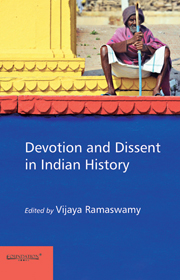Book contents
- Frontmatter
- Dedication
- Contents
- List of Tables and Figures
- Foreword
- Preface
- Introduction: Locating Devotion in Dissent and Dissent in Devotion A Thematic Overview
- Introduction
- 1 Parsing of Devotion and Dissent
- 2 Dissent and Protest in Early Indian Buddhism with Special Reference to Devadatta
- 3 Devotion and Dissent in Hunter's Bhakti
- 4 Devotion and Dissent
- 5 Dissent Within
- 6 Women in Love
- 7 Dissenting Voices
- 8 Dissent in Kabir and the Kabir Panth
- 9 Devotion and Dissent of Punjabi Dalit Sant Poets
- 10 Protest and Counter-protest
- 11 Fakirs of Bengal
- 12 Music in Chishti Sufism
- 13 Dissenting the Dominant
- 14 Devotion and Dissent within the Catholic Church in Late Colonial Bengal
- 15 Narratives of Travel, Voices of Dissent and Attacks on the Colonial Church Fabric of the European Missionaries
- 16 Devotion and Dissent in Narayana Guru
- 17 Sree Narayana Guru's Idioms of the Spiritual and the Worldly
- Contributors
- Index
9 - Devotion and Dissent of Punjabi Dalit Sant Poets
from Introduction: Locating Devotion in Dissent and Dissent in Devotion A Thematic Overview
Published online by Cambridge University Press: 05 October 2014
- Frontmatter
- Dedication
- Contents
- List of Tables and Figures
- Foreword
- Preface
- Introduction: Locating Devotion in Dissent and Dissent in Devotion A Thematic Overview
- Introduction
- 1 Parsing of Devotion and Dissent
- 2 Dissent and Protest in Early Indian Buddhism with Special Reference to Devadatta
- 3 Devotion and Dissent in Hunter's Bhakti
- 4 Devotion and Dissent
- 5 Dissent Within
- 6 Women in Love
- 7 Dissenting Voices
- 8 Dissent in Kabir and the Kabir Panth
- 9 Devotion and Dissent of Punjabi Dalit Sant Poets
- 10 Protest and Counter-protest
- 11 Fakirs of Bengal
- 12 Music in Chishti Sufism
- 13 Dissenting the Dominant
- 14 Devotion and Dissent within the Catholic Church in Late Colonial Bengal
- 15 Narratives of Travel, Voices of Dissent and Attacks on the Colonial Church Fabric of the European Missionaries
- 16 Devotion and Dissent in Narayana Guru
- 17 Sree Narayana Guru's Idioms of the Spiritual and the Worldly
- Contributors
- Index
Summary
The making of the Punjabi society, a frontier society, for the last 3,000 years has been a fascinating story of complex paradoxes. If the Punjab served as a theatre of warfare, it has also been an abode of sages, seers and sant poets. Perpetual political and ideological contestation did not necessarily close the doors to meditative contemplations. Even if the established religions, including the new ones, could not avoid sectarian manifestations, the universal spirituality kept the doors open for egalitarian inclusiveness cutting across all divisive lines. If the rise of Sikhism as a new religious ideology was a popular expression of egalitarian urges and came to offer respectable space to the untouchables from the sixteenth to the eighteenth century, it also degenerated to Brahmanical caste praxis by the mid-nineteenth century. Meanwhile, the Dalit sant poets, as part of the tradition, offer a seemingly paradoxical response of devotion and dissent. We have four major Punjabi Dalit poets emerging from the last quarter of the seventeenth century to the first quarter of the twentieth century who were soaked in the contemplative world of knowledge and spirituality, while seeking an egalitarian and just society. The Punjabi Dalit literary tradition begins with Bhai Jaita alias Jeevan Singh (c. 1655–1704), who became part of the guru's household as he had carried the severed head of Guru Teg Bahadur from Delhi to Anandpur, and in his late years, composed a devotional epic poem, Sri Gur Katha, around Guru Gobind Singh's life at the turn of the eighteenth century.
- Type
- Chapter
- Information
- Devotion and Dissent in Indian History , pp. 188 - 215Publisher: Foundation BooksPrint publication year: 2014



